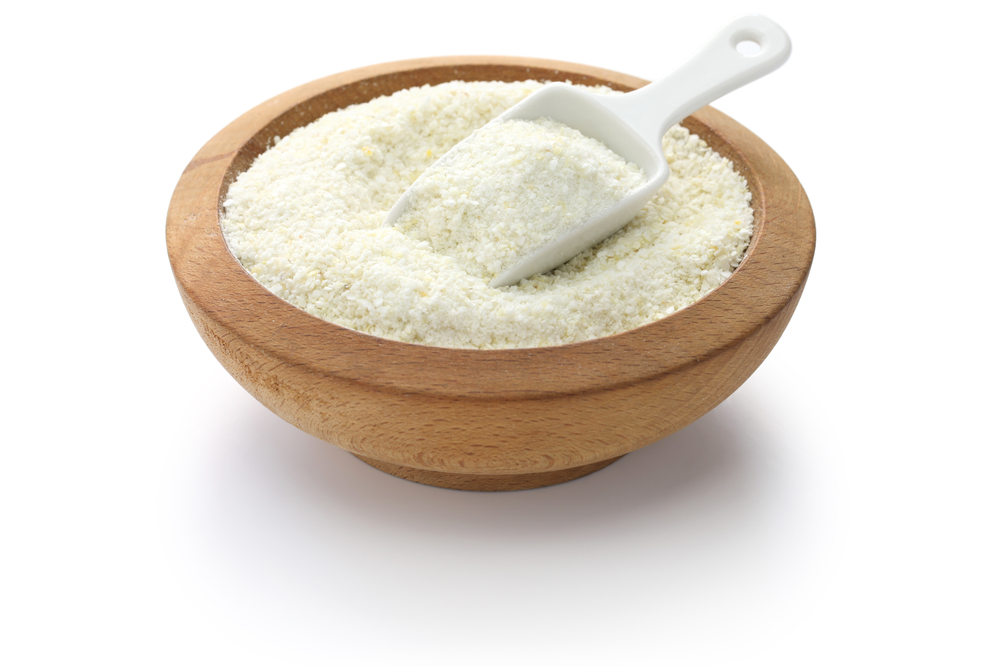As a gluten-free flour, teff flour is a popular choice for those with celiac disease or gluten intolerance. However, it can be challenging to find in some areas and may be more expensive than other flours.
Fortunately, there are several teff flour substitutes available that can be used in baking and cooking.
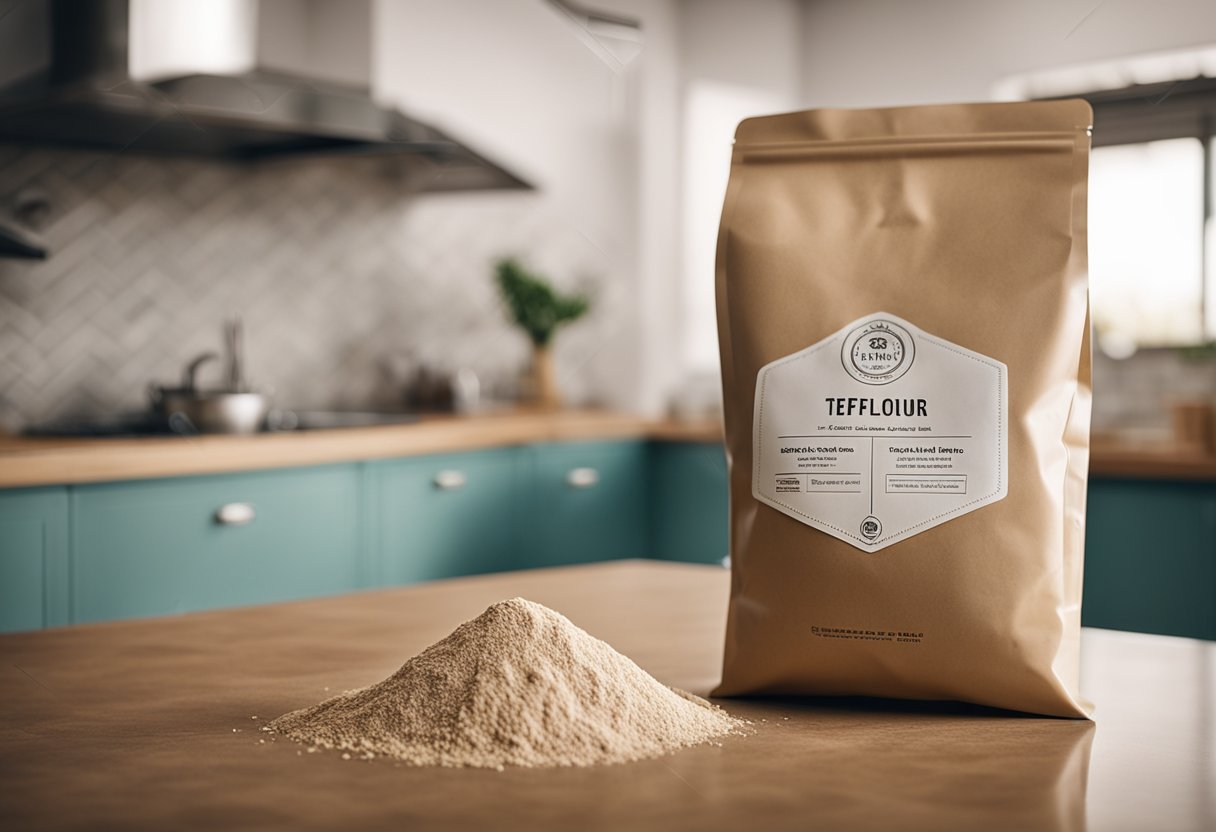
Understanding the characteristics of teff flour is essential when selecting a substitute. Teff flour is a whole-grain flour that has a slightly nutty flavor and is known for its high protein and fiber content.
A good substitute should have similar characteristics, such as a similar texture and flavor profile, and provide similar nutritional benefits.
Key Takeaways
- Teff flour is a popular gluten-free flour but can be expensive and hard to find in some areas.
- A good teff flour substitute should have similar characteristics, such as texture and flavor profile, and provide similar nutritional benefits.
- There are several teff flour substitutes available, including gluten-free flour substitutes and homemade flour substitutes.
Understanding Teff Flour
Teff flour is a nutritious and versatile ingredient that is gaining popularity in the culinary world. It is made by grinding the small seeds of the teff plant, which is an ancient grain that has been cultivated in Ethiopia for centuries.
In Ethiopian cuisine, teff flour is a staple ingredient used to make injera, a type of sourdough flatbread. However, teff flour can also be used in a variety of other dishes, including bread, pancakes, and muffins.
One of the benefits of using teff flour is that it is a good source of fiber, protein, calcium, and iron. It also contains other important nutrients, such as magnesium, phosphorus, and zinc.
Teff flour is also gluten-free, making it a great option for those with gluten sensitivities or celiac disease.
However, it is important to note that teff flour has a unique flavor and texture, so it may not be an exact substitute for other types of flour in all recipes.
Overall, teff flour is a nutritious and versatile ingredient that can add flavor and nutrients to a variety of dishes.
Why Substitute Teff Flour
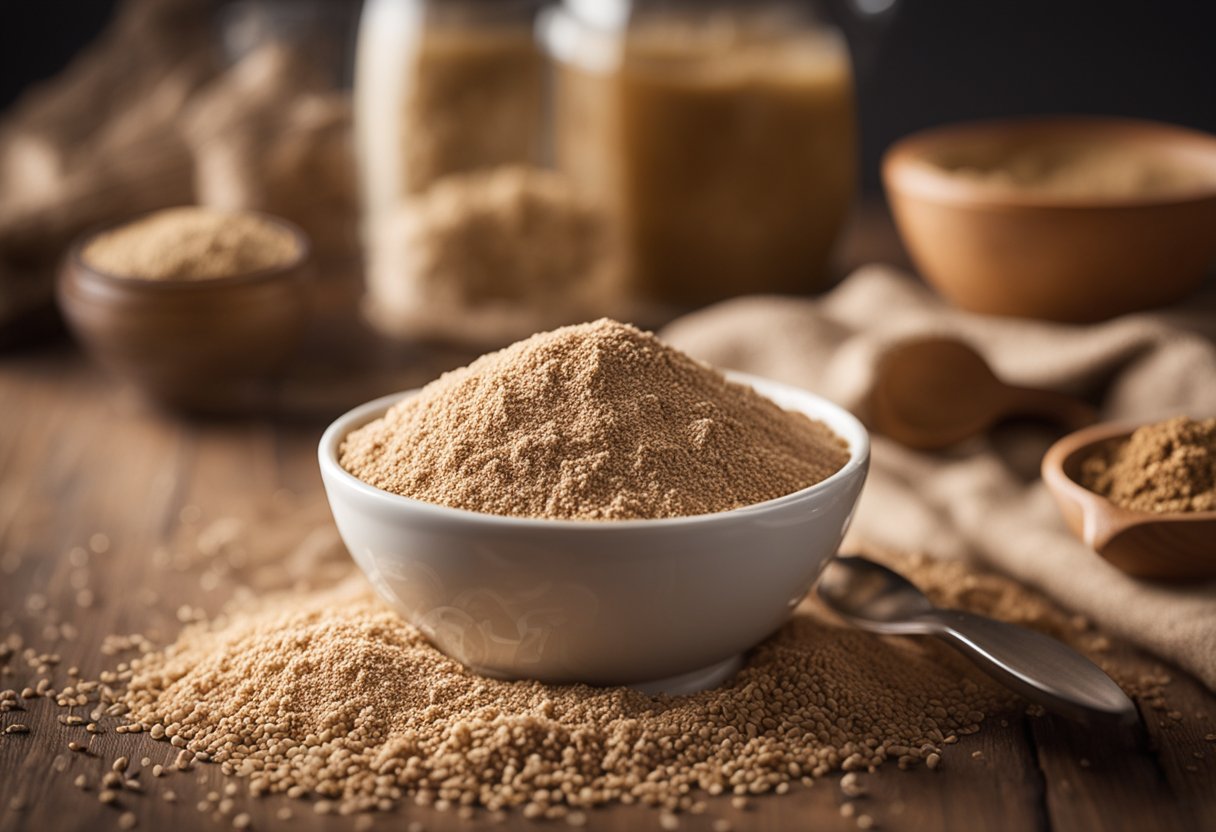
As someone who enjoys cooking and baking, I know how important it is to have a variety of ingredients on hand.
Sometimes, however, we may not have all the ingredients we need for a recipe, or we may need to substitute certain ingredients due to dietary restrictions or preferences.
This is where teff flour substitutes come in handy.
One of the main reasons why people substitute teff flour is due to gluten sensitivities or celiac disease. Teff flour is a gluten-free alternative to wheat flour, making it a great option for those who cannot consume gluten.
Additionally, teff flour is also free from other common allergens like soy, dairy, and nuts, making it an excellent choice for people with multiple food allergies.
Another reason why people may choose to substitute teff flour is due to its cost. Teff flour can be quite expensive, especially when compared to other gluten-free flours like rice or corn flour.
By substituting teff flour with other more affordable alternatives, you can still enjoy delicious baked goods without breaking the bank.
When it comes to finding the right teff flour substitute, there are plenty of options available. Some popular substitutes include quinoa flour, coconut flour, and tapioca flour.
Each of these flours has its own unique flavor and texture, so it’s important to experiment and find the one that works best for your recipe.
In conclusion, substituting teff flour can be a great option for those with gluten sensitivities, celiac disease, allergies, or those looking for a more affordable alternative.
With so many options available, it’s easy to find a teff flour substitute that works for your recipe.
Characteristics of a Good Substitute
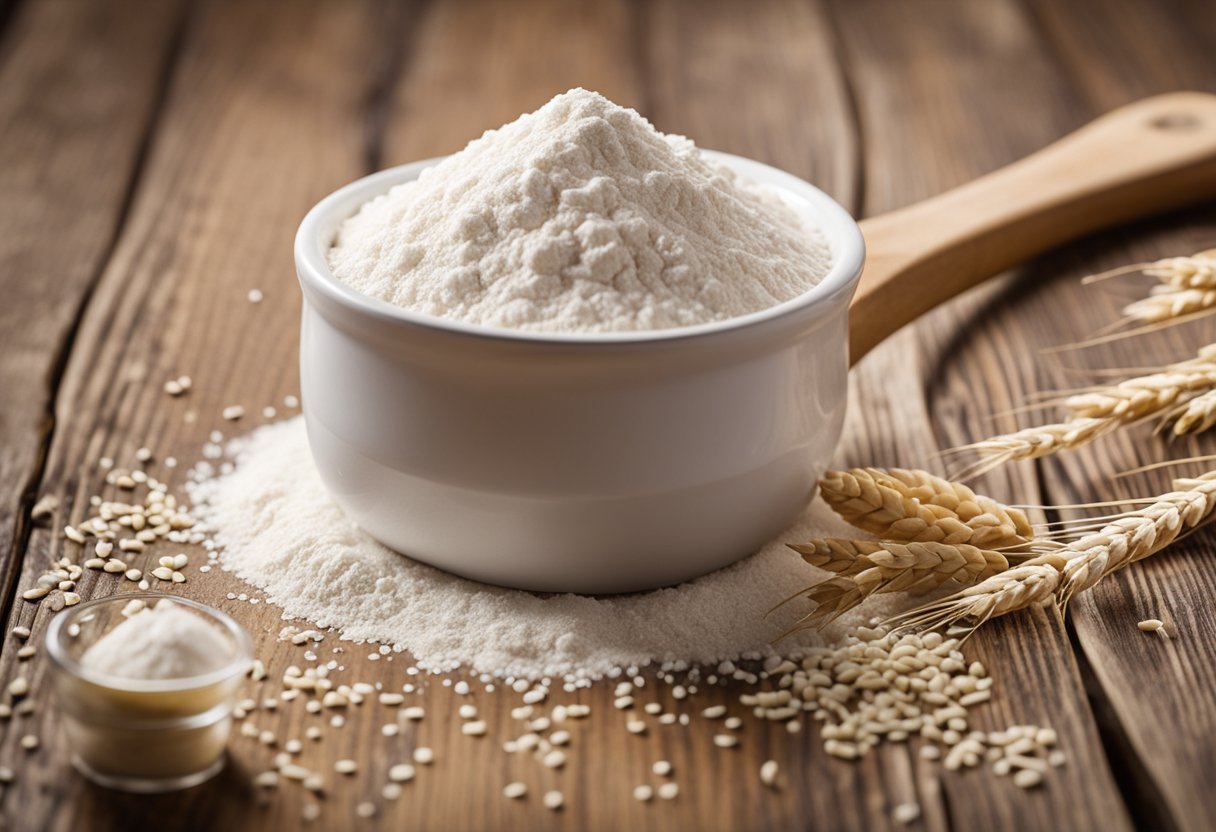
As someone who has experimented with various flours in my baking and cooking, I know the importance of finding a good substitute when you run out of a particular flour or need to avoid it for dietary reasons.
Here are some characteristics of a good substitute for teff flour:
Texture
Teff flour has a unique texture that can be challenging to replicate in a substitute. A good substitute should have a similar texture to ensure that your baked goods turn out just as you want them.
For example, quinoa flour has a similar texture to teff flour, making it an excellent substitute.
Sweetness
Teff flour has a slightly sweet taste that can be hard to replicate. A good substitute should have a similar level of sweetness to ensure that your baked goods have the right taste.
For example, coconut flour has a slightly sweet taste that can work well as a substitute.
Nutty Flavor
Teff flour has a nutty flavor that can add depth to your baked goods. A good substitute should have a similar nutty flavor to ensure that your baked goods have the right taste.
For example, almond flour has a nutty flavor that can work well as a substitute.
Nutritional Value
Teff flour is a whole grain that is gluten-free and packed with nutrients. A good substitute should be nutritionally similar to ensure that you get the same health benefits.
For example, buckwheat flour is a whole grain that is gluten-free and packed with nutrients, making it an excellent substitute.
Gluten-Free
Teff flour is gluten-free, making it an excellent choice for those with gluten sensitivities. A good substitute should also be gluten-free to ensure that you can still enjoy your baked goods.
For example, rice flour is gluten-free and can work well as a substitute.
Whole Grain
Teff flour is a whole grain, which means that it contains all parts of the grain, including the bran, germ, and endosperm.
A good substitute should also be a whole grain to ensure that you get the same health benefits. For example, oat flour is a whole grain that can work well as a substitute.
In conclusion, a good substitute for teff flour should have a similar texture, sweetness, nutty flavor, nutritional value, be gluten-free, and be a whole grain.
By keeping these characteristics in mind, you can find the perfect substitute for your baking and cooking needs.
Gluten-Free Flour Substitutes
As someone who loves to bake but cannot consume gluten, I have experimented with various gluten-free flour substitutes. Here are some of my favorite options:
- Sorghum Flour: Sorghum flour is a whole-grain flour that is similar in texture and flavor to teff flour. It is a great substitute for teff flour in recipes that require a nutty flavor.
- Quinoa Flour: Quinoa flour is a protein-rich flour that has a slightly nutty flavor. It is a great substitute for teff flour in recipes that require a similar texture and flavor.
- Rice Flour: Rice flour is a versatile flour that can be used in a variety of recipes. It has a mild flavor and a fine texture, making it a great substitute for teff flour in recipes that require a light and fluffy texture.
- Oat Flour: Oat flour is a nutritious flour that is high in fiber and protein. It has a slightly sweet flavor and a dense texture, making it a great substitute for teff flour in recipes that require a similar texture and flavor.
- Millet Flour: Millet flour is a gluten-free flour that has a slightly sweet flavor and a light texture. It is a great substitute for teff flour in recipes that require a similar texture and flavor.
- Coconut Flour: Coconut flour is a high-fiber flour that has a sweet and nutty flavor. It is a great substitute for teff flour in recipes that require a similar texture and flavor.
- Tapioca Flour: Tapioca flour is a starchy flour that is similar in texture to teff flour. It has a neutral flavor, making it a great substitute for teff flour in recipes that require a similar texture.
- Buckwheat Flour: Buckwheat flour is a gluten-free flour that has a nutty flavor and a slightly dense texture. It is a great substitute for teff flour in recipes that require a similar texture and flavor.
- Brown Rice Flour: Brown rice flour is a whole-grain flour that has a slightly nutty flavor and a dense texture. It is a great substitute for teff flour in recipes that require a similar texture and flavor.
- White Rice Flour: White rice flour is a refined flour that has a mild flavor and a fine texture. It is a great substitute for teff flour in recipes that require a light and fluffy texture.
- Almond Flour: Almond flour is a high-protein flour that has a slightly sweet and nutty flavor. It is a great substitute for teff flour in recipes that require a similar texture and flavor.
- Cornmeal: Cornmeal is a coarse flour that has a slightly sweet flavor and a dense texture. It is a great substitute for teff flour in recipes that require a similar texture and flavor.
- Barley Flour: Barley flour is a whole-grain flour that has a nutty flavor and a dense texture. It is a great substitute for teff flour in recipes that require a similar texture and flavor.
Overall, there are many gluten-free flour substitutes that can be used in place of teff flour. Experiment with different flours to find the one that works best for your recipe.
Using Teff Flour Substitutes in Baking
As a baker, I understand the importance of having the right ingredients for a recipe.
However, sometimes we run out of a specific ingredient or need to make adjustments due to dietary restrictions. That’s where teff flour substitutes come in handy.
When using teff flour substitutes in baking, it’s important to keep in mind that teff flour has a unique flavor and texture.
Therefore, it’s best to use a substitute that will complement the recipe. Here are some substitutes that work well in baking:
- Quinoa Flour: This pseudo-grain flour has a mild flavor and can be used as a 1:1 substitute for teff flour in baking recipes.
- Sorghum Flour: This gluten-free flour has a slightly sweet flavor and can be used as a 1:1 substitute for teff flour in baking recipes.
- Rice Flour: This gluten-free flour has a neutral flavor and can be used as a 1:1 substitute for teff flour in baking recipes.
- Oat Flour: This gluten-free flour has a slightly sweet flavor and can be used as a 1:1 substitute for teff flour in baking recipes.
- Millet Flour: This gluten-free flour has a mild flavor and can be used as a 1:1 substitute for teff flour in baking recipes.
- Coconut Flour: This gluten-free flour has a sweet flavor and high fiber content. It’s best used in combination with other flours as it absorbs a lot of liquid.
When substituting teff flour in baking recipes, it’s important to keep in mind that teff flour absorbs more liquid than other flours.
Therefore, it’s best to adjust the liquid in the recipe accordingly. Additionally, teff flour doesn’t contain gluten, so you’ll need to add a binding agent like eggs or xanthan gum.
In bread recipes, it’s best to use a combination of teff flour substitutes to achieve the desired texture and flavor. For cakes, pancakes, cookies, and pastries, you can use a single teff flour substitute.
Overall, using teff flour substitutes in baking is a great way to accommodate dietary restrictions or simply experiment with new flavors.
With the right substitute and adjustments, you can still achieve delicious baked goods.
Using Teff Flour Substitutes in Cooking
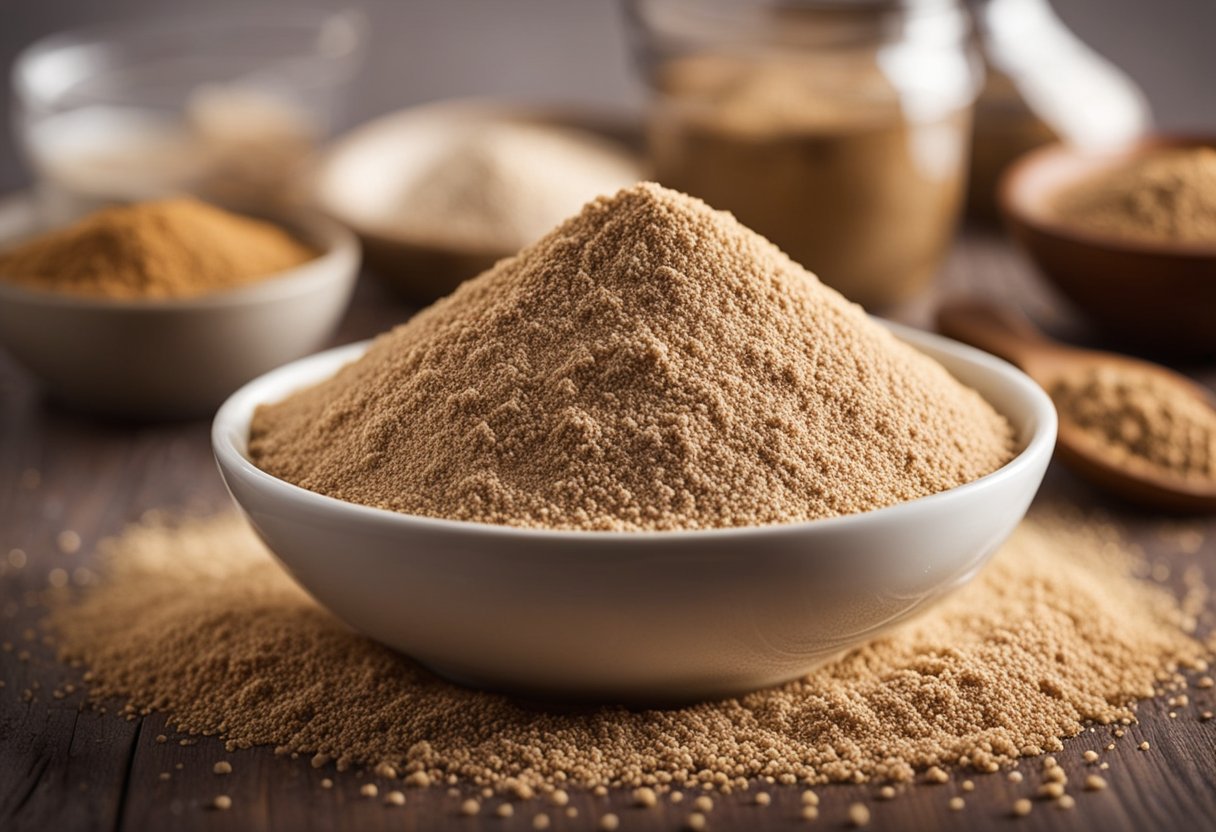
As a home cook, I often find myself running out of certain ingredients. Teff flour is one of those ingredients that I don’t always have on hand. However, I have discovered several substitutes that work well in my cooking.
When making porridge, I have found that substituting teff flour with quinoa flour works well. Quinoa flour has a similar texture and nutty flavor to teff flour, which makes it a great substitute.
Additionally, quinoa is a complete protein, making it a nutritious addition to any meal.
For flatbreads and pizza crusts, I have had success using a combination of rice flour and tapioca flour. The rice flour provides a light texture, while the tapioca flour adds elasticity.
This combination creates a crust that is crispy on the outside and tender on the inside.
When making pasta, I have found that using a combination of sorghum flour and corn flour works well as a teff flour substitute.
The sorghum flour provides a nutty flavor, while the corn flour adds a slightly sweet taste. This combination creates a pasta that is flavorful and has a nice texture.
Overall, there are several substitutes that can be used in place of teff flour. When cooking, it is important to experiment with different substitutes to find the one that works best for the specific recipe.
By doing so, you can create delicious meals without having to run to the store for a specific ingredient.
How to Make Your Own Flour Substitutes
As a home chef, I love experimenting with different ingredients in my recipes. One of the best ways to do this is by making my own flour substitutes.
Not only is it cost-effective, but it also allows me to customize the flavor and texture of my dishes.
To make your own flour substitute, you will need a food processor or blender. Here are a few examples of flour substitutes you can make:
Dried Coconut Meat
Dried coconut meat is a great substitute for wheat flour. Simply blend dried coconut meat in a food processor until it reaches a flour-like consistency.
This flour substitute is perfect for baking and adds a subtle coconut flavor to your recipes.
Rolled Oats
Rolled oats are another great substitute for wheat flour. Simply blend rolled oats in a food processor until it reaches a flour-like consistency.
This flour substitute is perfect for making pancakes, waffles, and muffins.
Quinoa Seed
Quinoa seed is a great substitute for teff flour. Simply blend quinoa seeds in a food processor until it reaches a flour-like consistency.
This flour substitute is perfect for making gluten-free bread and pasta.
Cassava Root
Cassava root is a great substitute for wheat flour. Simply peel and chop cassava root, then blend it in a food processor until it reaches a flour-like consistency.
This flour substitute is perfect for making gluten-free bread, cakes, and cookies.
By making your own flour substitutes, you can easily customize the flavor and texture of your dishes. Experiment with different ingredients and see what works best for your recipes.
Nutritional Comparisons
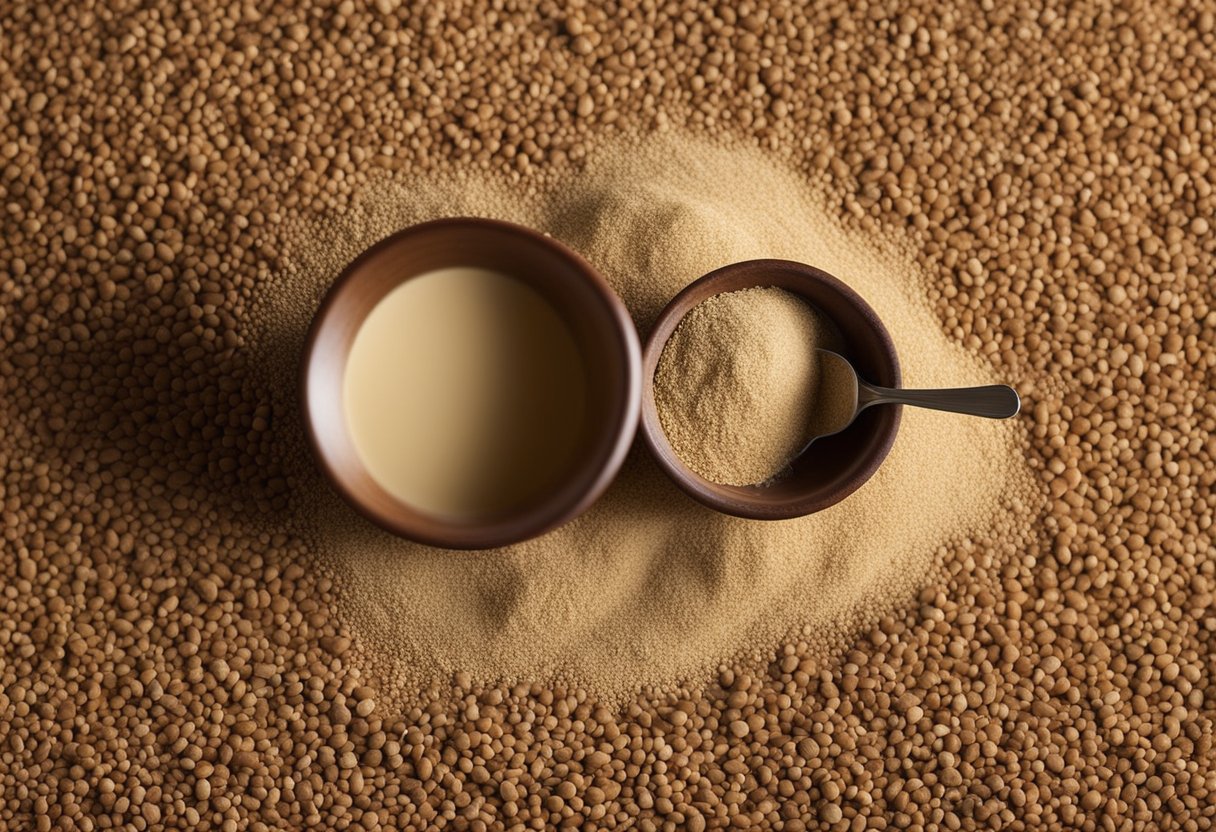
Teff flour is a nutrient-rich flour that is a great addition to a balanced diet. It is rich in essential nutrients, including fiber, protein, calcium, iron, magnesium, and B vitamins.
When compared to other flours, teff flour stands out for its impressive nutrient profile.
In terms of fiber, teff flour is an excellent source. It contains about 8 grams of fiber per 100 grams of flour, which is significantly higher than wheat flour and many other types of flour.
Fiber is important for digestive health, and it can help regulate blood sugar levels and lower cholesterol.
Teff flour is also a good source of protein, with about 13 grams of protein per 100 grams of flour. This makes it a great option for vegetarians and vegans who may be looking for plant-based sources of protein.
When it comes to calcium, teff flour is a standout. It contains about 180 mg of calcium per 100 grams of flour, which is more than double the amount found in wheat flour.
Calcium is important for strong bones and teeth, and it also plays a role in muscle function and nerve transmission.
Teff flour is also a good source of iron, with about 4 mg of iron per 100 grams of flour. This is important because iron is essential for the production of red blood cells, which carry oxygen throughout the body.
Finally, teff flour is a good source of magnesium and B vitamins. Magnesium is important for bone health, muscle function, and nerve transmission, while B vitamins play a role in energy metabolism and brain function.
Overall, teff flour is a nutrient-rich flour that is a great addition to a healthy diet. It stands out for its high fiber, protein, calcium, iron, magnesium, and B vitamin content.
Health Considerations
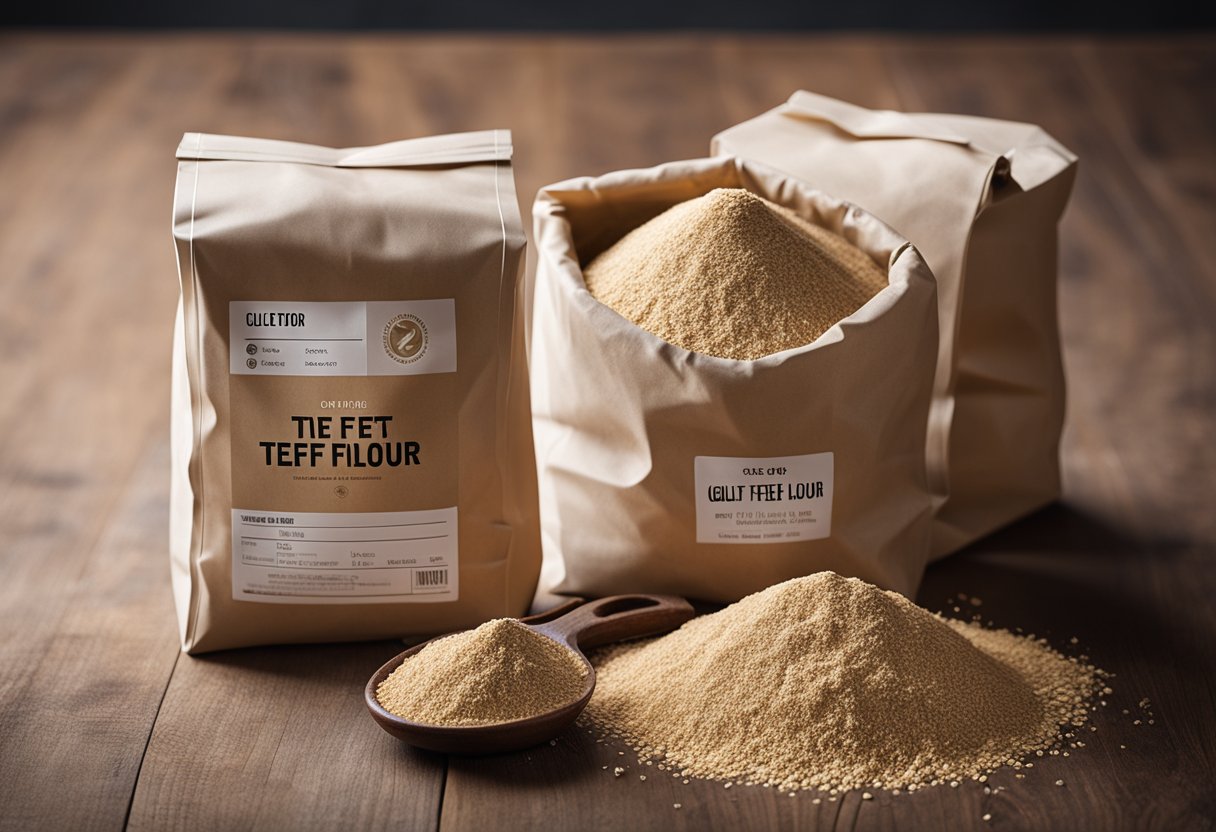
As someone who is health-conscious, I always consider the nutritional value of the ingredients I use in my meals. When it comes to teff flour substitutes, it’s important to keep some health considerations in mind.
One of the significant benefits of using teff flour is that it is gluten-free. For people with celiac disease or gluten intolerance, teff flour is an excellent option.
It is also a great choice for individuals who follow a gluten-free diet. However, it’s important to note that not all teff flour substitutes are gluten-free. Make sure to read the labels carefully before purchasing.
Another health consideration to keep in mind is diabetes. Teff flour is a low glycemic index food, which means it doesn’t cause a spike in blood sugar levels.
This makes it a suitable ingredient for people with diabetes or those who are trying to manage their blood sugar levels.
However, some teff flour substitutes may contain higher levels of carbohydrates, so it’s essential to check the nutritional information before using them.
Lastly, teff flour is rich in fiber, which is essential for digestive health. It can help regulate bowel movements, prevent constipation, and promote a healthy gut.
When choosing a teff flour substitute, it’s important to consider the fiber content. Some substitutes may not be as high in fiber as teff flour, so make sure to read the labels carefully.
Overall, when it comes to health considerations, teff flour is an excellent choice. It is gluten-free, low glycemic index, and high in fiber.
However, it’s important to read the labels carefully when choosing a teff flour substitute to ensure it meets your nutritional needs.
Where to Buy Flour Substitutes
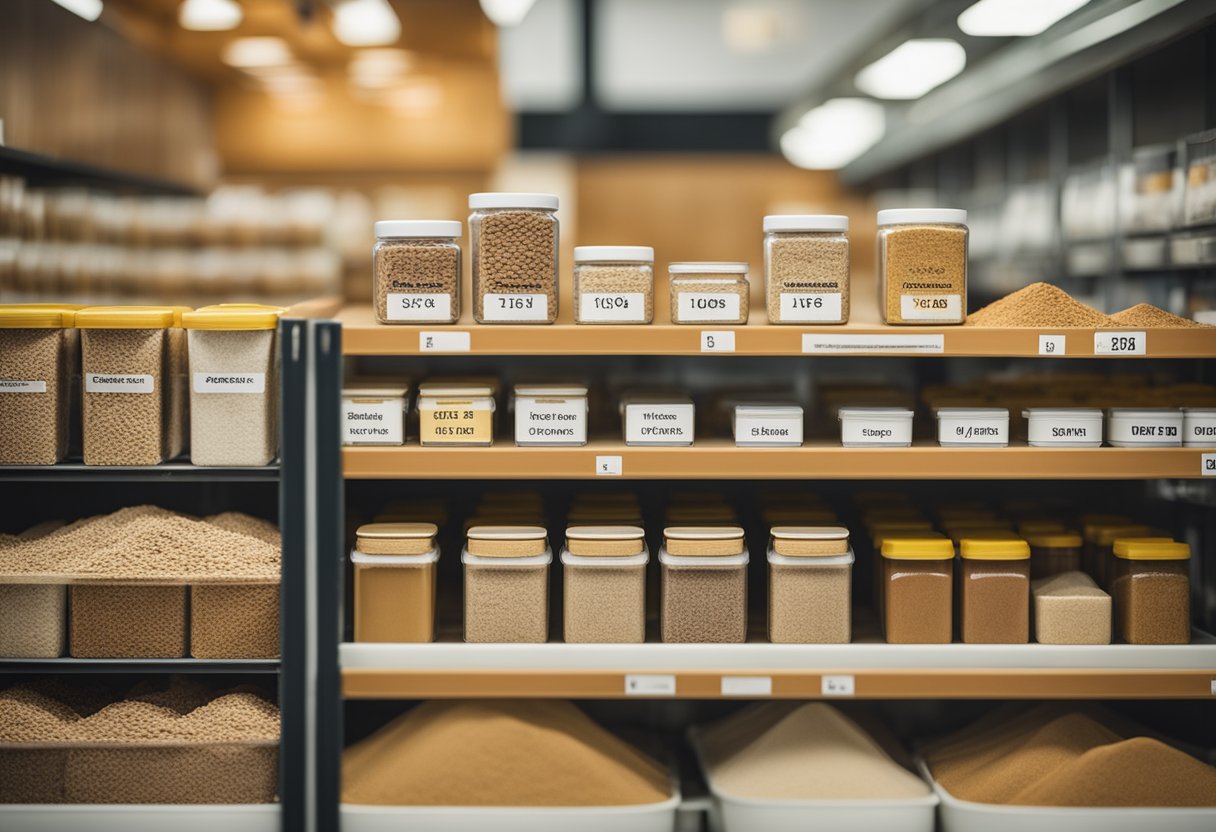
When looking for flour substitutes like teff flour, there are several options available. One of the most convenient places to find flour substitutes is at your local health food store.
These stores typically carry a wide variety of alternative flours, including teff flour substitutes.
If you have trouble finding what you need at your local health food store, you can also try looking online. Many online retailers specialize in alternative flours and have a wide selection of products available.
Some popular online retailers that offer teff flour substitutes include Amazon, Thrive Market, and Vitacost.
Another option is to check out your local grocery store.
While they may not have as extensive a selection as a health food store, many grocery stores now carry alternative flours like teff flour substitutes. Look for them in the baking aisle or in the gluten-free section.
If you prefer to buy in bulk, you can also check out bulk food stores or co-ops. These stores often carry alternative flours in bulk, which can be a more cost-effective option if you use a lot of flour substitutes in your cooking and baking.
Overall, there are many options available when it comes to buying flour substitutes like teff flour. Whether you prefer to shop in person or online, you should be able to find what you need with a little bit of research and effort.
Conclusion
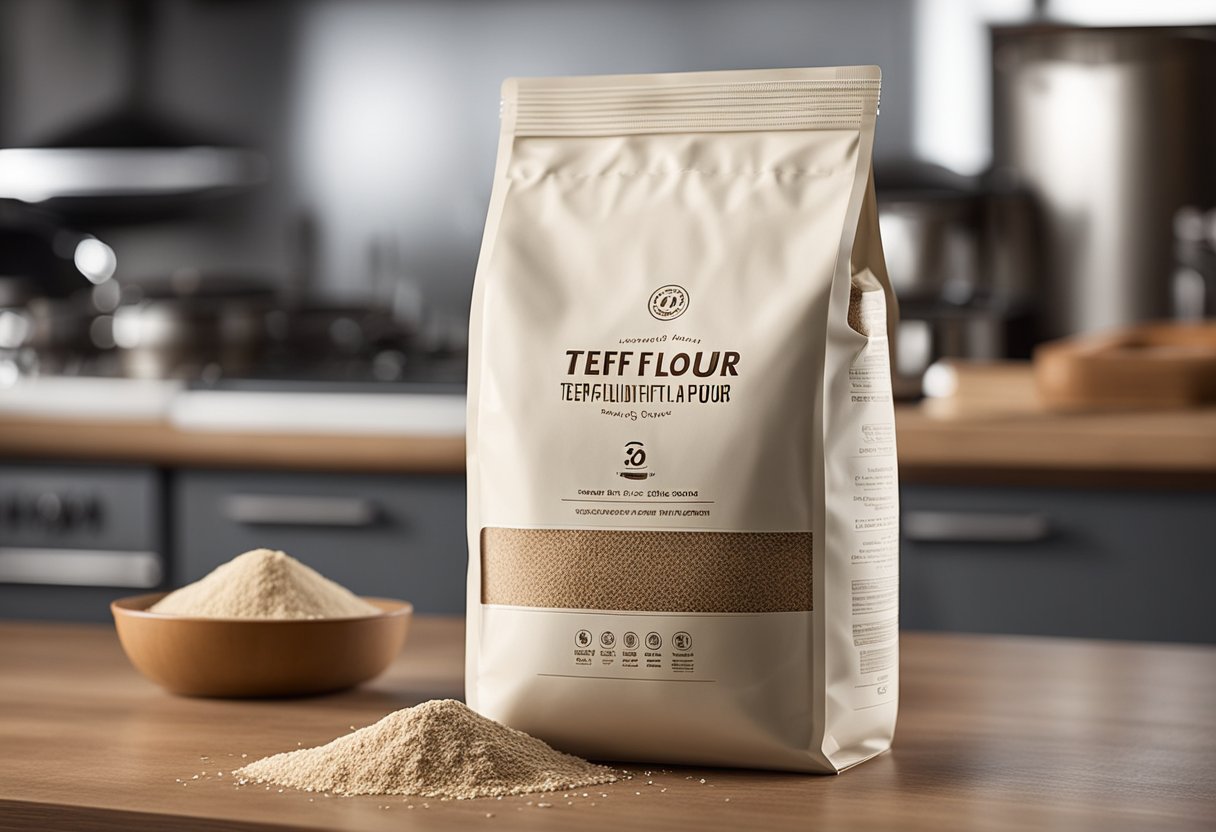
In conclusion, finding a suitable teff flour substitute is crucial for gluten-free baking. Teff flour is a nutritious grain flour that adds a distinctive nutty flavor to baked goods.
However, if you cannot find teff flour or are looking for a different taste, there are several substitutes available.
Buckwheat flour, quinoa flour, rice flour, tapioca flour, and amaranth flour are some of the best substitutes for teff flour.
Each of these flours has unique properties that make them a good substitution for teff flour.
For instance, buckwheat flour has a slightly earthy taste and is gluten-free, while quinoa flour has a nutty flavor and is high in protein.
When substituting teff flour with another flour, it is essential to understand the ratio. For example, you can substitute teff flour for up to 25 percent of the wheat flour called for in a recipe.
However, the ratio may vary depending on the recipe and the substitute used.
It is also worth noting that some substitutes may alter the texture and taste of baked goods. Therefore, it is crucial to experiment with different flours to find the best one for your needs.
Overall, finding a versatile teff flour substitute is possible, and it allows you to enjoy gluten-free baking without compromising taste and nutrition.
Frequently Asked Questions
What are some gluten-free flour substitutes for teff flour?
If you are looking for gluten-free flour substitutes for teff flour, you can try using tapioca flour, sorghum flour, rice flour, or buckwheat flour.
These flours have similar textures and consistencies to teff flour and can be used in a variety of recipes.
What are some recipes that use buckwheat flour instead of teff flour?
Buckwheat flour is a great substitute for teff flour in recipes like pancakes, waffles, and crepes. You can also use buckwheat flour in bread, muffins, and other baked goods.
Can oat flour be used as a substitute for teff flour in baking?
Yes, oat flour can be used as a substitute for teff flour in baking. However, oat flour has a different texture and consistency than teff flour, so you may need to adjust the recipe accordingly.
What are some injera recipes that don’t use teff flour?
If you want to make injera but don’t have teff flour, you can use a combination of wheat flour and barley flour. You can also try using rice flour or cornmeal as a substitute.
What are some other flours that are similar to teff flour?
Some other flours that are similar to teff flour include amaranth flour, quinoa flour, and millet flour. These flours have a similar texture and consistency to teff flour and can be used in a variety of recipes.
What is a good substitute for injera flour?
If you are looking for a good substitute for injera flour, you can try using a combination of wheat flour and barley flour. You can also try using rice flour or cornmeal as a substitute.





